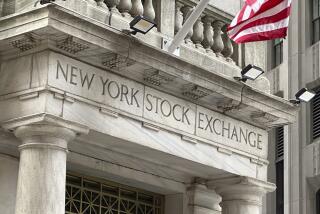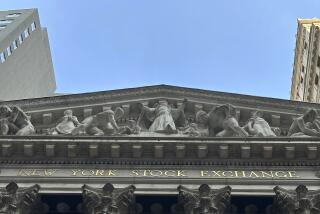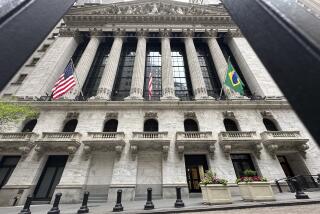Profits Fall at Major Wall Street Firms : Earnings: Merrill Lynch, Lehman Bros. report steep drops in second-quarter income.
- Share via
Merrill Lynch & Co., the nation’s largest brokerage, and Lehman Bros. Holdings Inc., the investment banking firm, reported sharp drops in quarterly profit Tuesday due to this year’s financial market plunge.
Brokerage analysts said the results continued the recent trend of depressed earnings at major Wall Street firms.
“The market turned out to be more difficult than many people expected,” said Raphael Soifer, an industry analyst at Brown Bros. Harriman & Co.
Merrill Lynch said its profit dropped by 27% to $251.8 million in the second quarter partly due to a sharp drop in global underwriting volume, which cut investment banking revenues by 22%.
Meanwhile, the 1994 spike in interest rates and volatile currency markets eroded revenues from stock, bond and foreign exchange trading.
Merrill Lynch’s quarterly profit amounted to $1.18 per share, down from $345 million, or $1.52 per share, in the same period a year earlier. Revenues were $4.48 billion, up 13% from $3.96 billion.
Depressed markets also hurt Lehman Bros. Holdings Inc., the investment banking firm that was spun off from American Express Co. this year. Lehman posted a 84% net income drop in the second quarter, its first period as an independent company.
Lehman Bros. said second-quarter profit dropped to $13 million, or 11 cents per share, compared to $83 million for comparable Lehman businesses in the year-ago period, when the firm was still owned by American Express. There were no per-share figures for the 1993 second quarter because the company was not yet public.
Revenues rose to $2.34 billion from $2.19 billion.
Like other Wall Street firms, Lehman’s underwriting of new stock and bond issues declined as a result of the financial market turbulence.
Cleveland-based TRW Inc. reported a nearly 57% increase in second-quarter earnings, chiefly because of strong profit performance from its air bag business.
The company reported net income of $86.6 million, or $1.33 per share, on sales of $2.32 billion in the second quarter. That’s up from earnings of $55.2 million, or 85 cents per share, on sales of $2.01 billion.
TRW, which makes parts for the automotive and aerospace industries and operates a credit-reporting service, said its air bag business was the strongest performer in the quarter. Auto parts sales were up by more than 25% and operating profit for the division rose 51% to $119.3 million.
Sales rose slightly in its space and defense segment, but operating profit dipped about 12%.
General Electric Co., boosted by strong gains in nine of its 12 businesses reported a 14% jump in second quarter profit.
The company earned $1.52 billion, or 89 cents a share, in the quarter that ended June 30. It earned $1.33 billion, or 78 cents a share, in the second quarter of 1993.
The Fairfield, Conn., firm reported revenues of $16.2 billion, a 10% increase from $14.8 billion in last year’s second quarter.
The conglomerate’s businesses range from aircraft engines and household appliances to broadcasting and financial services.
Profit from operations at GE Capital Services rose 12% to $463 million, with strong results in insurance and equipment management more than offsetting the previously announced $29 million loss at its Kidder, Peabody & Co. brokerage firm.
Results were lower at NBC and GE Aircraft Engines.
GTE Corp., the nation’s largest local phone company, said its second-quarter profit rose 8% before gains and charges are figured in.
Including the special items, profit rose about 35%. The company’s net income in the quarter that ended June 30 was $595 million, or 62 cents per share. A year earlier, GTE earned $438 million, or 46 cents per share.
During the latest quarter, GTE recorded $71 million in after-tax gains from the sale of telephone properties it didn’t need. And a year ago, it had a special charge of $46 million for employee buyouts.
Revenue was $4.96 billion, up from $4.92 billion a year ago, the first quarterly increase for GTE in nearly two years.
Stamford, Conn-based GTE operating income for its core telephone operations business was $1.06 billion, up 6% from a year ago. The number of lines increased 5% and usage was up nearly 10%.
Sprint Corp., the third-largest long distance company, reported a 40% increase in net income for the second quarter.
Sprint earned $220 million, or 63 cents a share, in the quarter that ended June 30. It earned $157 million, or 46 cents a share, in the same period last year.
Revenue was $3.2 billion, up from $2.8 billion a year ago.
The Kansas City-based company said long-distance operating income increased 30% from $121 million a year ago to $158 million. Revenue was up 12% from $1.5 billion to $1.7 billion.
Computer maker Unisys Corp. posted a 51% drop in second-quarter earnings chiefly due to weakness in European markets.
Unisys earned $49.9 million, or 12 cents a share, in the three months ended June 30, compared to $103.0 million, or 39 cents a share, during the same period a year earlier.
Revenue declined 7% to $1.80 billion from $1.93 billion.
Alaska Air Group Inc., parent company of Alaska Airlines and Horizon Air, reversed last year’s second-quarter loss as revenues rose 19% while expenses were held to an 11% rise, the company said Tuesday.
Net income for the three months ended June 30 was $9.7 million, or 72 cents per share, compared to last year’s second-quarter loss of $3.6 million, or 33 cents per share. Revenues rose to $330.5 million from $277.5 million.
Alaska Airlines passenger traffic increased 42% on a capacity increase of 31%. The airline’s operating costs declined from 10.1 cents to 8.6 cents per available seat mile.
More to Read
Inside the business of entertainment
The Wide Shot brings you news, analysis and insights on everything from streaming wars to production — and what it all means for the future.
You may occasionally receive promotional content from the Los Angeles Times.










